Photographs: Sreeram Selvaraj Shobha Warrier
Vijay Anand, vice president (new ventures), Rural Technology and Business Incubator, at IIT-Madras, is the man behind incubating new ideas for rural India.
He is also called 'the start-up guy', having started his own company as a student in Canada. He is now trying to bring in a start-up revolution in India.
Proto.in, an event he used to organise for a while from 2006, to bring in new start-ups under one umbrella, is the best example of his commitment to start-ups.
It was this commitment that won him the Nasscom Ecosystem Evangelist Award.
According to Vijay Anand, he lives a 'double life': one as the vice president of RTBI, and another as the man behind Proto.in and start-ups.
In this exclusive interview, he talks about both his work at RTBI and also the start-up scenario in India.
How did you get involved with RTBI?
It is a long story. I went to Canada for my studies but was running my own company when I was still studying. So my desire to be an entrepreneur started when I was a student. We sold the company after a while and made money.
. . .
The inspiring story of India's 'start-up guy'
When I came back to India for personal reasons 5-6 years ago, I found that it took 100 days to register a company in India while it took just two hours in Canada!
I came to Chennai to meet Prof. Jhunjhunwala (at IIT-Madras), mainly to discuss start-ups.
Any particular reason why you wanted to meet Prof. Jhunjhunwala? Has it anything to do with rural India?
It had a lot to do with entrepreneurship but not rural India then. I knew that IIT-Madras was doing something on incubation and helping young guys set up companies.
I felt there are many ways we can help them set up companies, like all the way from starting them to taking them to the market. I felt there is no formal place where an entrepreneur can take his ideas and seek help.
The questions in my mind were: Where do start-ups go? When they have no visibility at all in India, how will they raise money and attract talent? People were talking only about services companies like Infosys and there was no talk of start-ups.
On the other hand, things were different in Canada -- so far as mentors for start-ups are concerned.
. . .
The inspiring story of India's 'start-up guy'
Was there a difference in the way start-ups are looked at in developed countries and in India?
Yes, there was a difference. I would say six years ago, the contrast was very significant, but today, it is not so much. I think India is catching up extremely fast.
In the West, people who venture into start-ups are considered extremely smart people. On the other hand, in India, most of those who decide to be entrepreneurs are called unemployed ones. But, yes, the perception is changing.
In my meetings with college students, I used to tell them to start something of their own so that they will learn hands-on about everything. They are creating something out of nothing.
When they ask me whether they should start a services company like Infosys, I tell them to think of starting a Max or Google out of India.
We are a country of a billion people but we don't have any start-ups like that. We hear about Tatas and Infosys who do servicing, but not about start-ups that build products.
But things are changing. Even in a conservative city like Chennai, every six months, 700 start-ups are coming up these days. These are guys who operate out of garages and houses but we don't hear about them at all.
That is why we decided to have an event -- Proto.in -- at IIT-Madras where we can showcase such start-ups.
. . .
The inspiring story of India's 'start-up guy'
Has Proto.in got anything to do with RTBI?
No, I bring in a lot of start-ups under Proto by working closely with organisations like Nasscom. My weekends are for Proto and weekdays for RTBI.
Proto has nothing to do with rural India; it is only about entrepreneurship. Proto is a community driven initiative, an event which I started in 2006 where we showcase the best start-ups.
It was held once every six months to help entrepreneurs convert ideas into prototypes. This is the place where they would come and show the product and not just the idea or a Power Point presentation.
Where was the first Proto held, and how was the response?
Incidentally for our first event, Rediff.com was one of our first sponsors. The first edition happened at IIT-Madras. In fact, the first three editions were done in Chennai. We had close to 200 people attending the event.
Saloni Malhotra's Desi Crew was showcased there. It is one of the big success stories. Uniphore also was showcased at Proto.
In four years, the community has grown to 10,000-plus entrepreneurs. We choose the top ten entrepreneurs at every event. That is because we want the best products to come out of India.
We have found that with every Proto, the quality of products has gone up.
After the first three editions, we started moving out of Chennai. Those who came to present at the event in Chennai started helping us at other local areas.
We did one in Delhi, one in Mumbai, one in Pune and one in Bengaluru.
. . .
The inspiring story of India's 'start-up guy'
Is there any difference in the ideas that come from the various cities?
Each city has its flavour. Pune has a very local young vibe. More than Bengaluru, it is Pune that has the largest start-up community. Pune has about 8,000 members.
Today, we are active in 13 cities across the country. Every month, there is a meeting happening in all the cities.
What you gain from working with entrepreneurs is that, you are humbled every day by their new and interesting ideas.
How important are start-ups for the economy of a country?
Very, very important. Yes, the services boom has helped the country boost its confidence. But our way of measuring up to the world is through entrepreneurship.
Look at the Tata Nano: a success story, the cheapest car in the world! We need many such success stories in product development.
I believe that when economies move from a developing to a developed state, they always seem to skip a couple of steps. The best example is what happened in the telecommunication in India; we skipped several steps to reach the mobile service.
Entrepreneurs are the ones who drive an economy. Bigger companies are scared to take the leap but start-ups or small companies are not sacred to be experimental. They are the ones who explore new frontiers. Proto showcases such entrepreneurs.
. . .
The inspiring story of India's 'start-up guy'
Image: Vijay Anand.Photographs: Sreeram Selvaraj
What are your plans for Proto?
We don't do Proto any more. When we started, we had decided that when everybody agrees that there are product start-ups in India, our job is more or less accomplished.
Today, organisations like Nasscom do events for start-ups. In fact, many people are trying to promote start-ups.
We are trying to look beyond events, things like arranging angel funds. For that, we want to put up a start-up centre or an incubation centre now. We are also trying to see how to help companies access clients. All this is beyond Proto.
When did you join RTBI as a vice president?
In 2006 itself, RTBI was started and I became the first employee.
. . .
The inspiring story of India's 'start-up guy'
What was the purpose behind starting RTBI? Tenet (Telecommunications and Computer Networks Group, IIT-Madras) was working for rural India at that time
Yes, Tenet group was active but those associated with it were academicians, busy with teaching and other related work. So we thought we would make it a different entity.
Today, when you talk about rural India, the first thought that comes to mind is empathy. There are 730 million people, almost twice the size of United States.
These people are spread across 600,000 villages. All of them want to live like urban Indians when urban India wants to live the West. Aspiration levels are there but they are finding it difficult to get them. NGOs are doing great work but most of the time that was not exactly what they want.
We feel entrepreneurship driven methods work better for rural development. You take a business or project to rural India and if they like the service, they pay for it. If not, they reject you. There are business incubators in India but none that focus on rural population. That is the idea behind RTBI.
. . .
The inspiring story of India's 'start-up guy'
As the vice president of RTBI, what do you do for entrepreneurs?
At RTBI, we are structured internally in three different sections. One section looks at technologies for rural India, another finds out about social impact. And I look at the business point of view.
A rural business has to succeed in all three of them. With the right technology, we should be able to make life better for the rural people.
At RTBI, in a short span of four years, we have incubated 16 companies that are working for rural India successfully. Out of this, six are full-fledged and on their own. Another four will graduate in the next one year. We plan to incubate 4-5 companies every year.
On an average, 30-40 people come with business plans every month. We spend time with all of them. Unfortunately, most of them are raised in urban India with no idea about rural India. So, we tell them to go and spend some time in rural India first.
I would say 60 per cent of the people associated with RTBI are so committed that they have moved to Chennai from places like Delhi, Assam, etc.
For example, Saloni of Desi Crew, Umesh of Uniphore, etc. moved to Chennai without even knowing the local language. That is a huge commitment and that is what we expect from everyone.
. . .
The inspiring story of India's 'start-up guy'
You said you get 30-40 ideas every month. What do you look for in them?
Entrepreneurs need to have an absolute idea of how rural India works. They also need to know how technology works and also how business works.
It is very important to understand how your delivery mechanism is going to be. We also look for commitment. Usually we grade people on the basis of these things.
You got the Nasscom Ecosystem Evangelist Award recently for your work with start-ups...
It is great that Nasscom is realising that there is a start-up ecosystem in India. The credit goes to the change in the perception and not what I did.
I think we have still a long way to go. Today, in India, it takes a long time for a company to achieve what it plans to do.
On an average, a company is built and sold in three years in the United States. It took 25 years for Infosys to build. The time span is shrinking but it's still not three years.
In the US, people are for ideas. India is full of ideas but the problem lies in infrastructure or ecosystem. We don't have a distribution network. So, it takes much longer to reach the target.
Ecosystem is what is lacking here. We, at RTBI, are working on that. We may be 20 years behind the US, but in another 5-10 years, we will catch up.

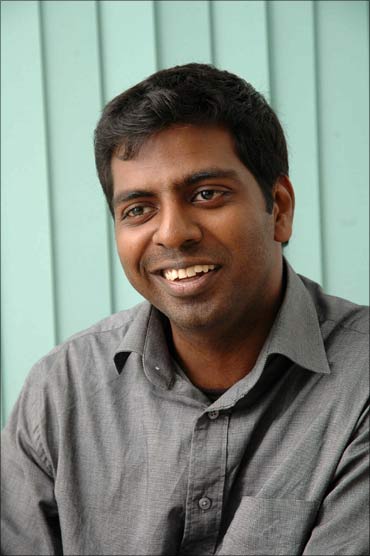

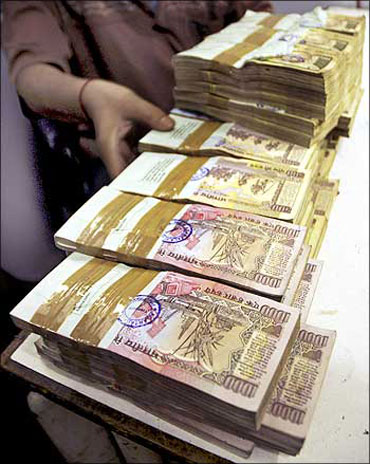


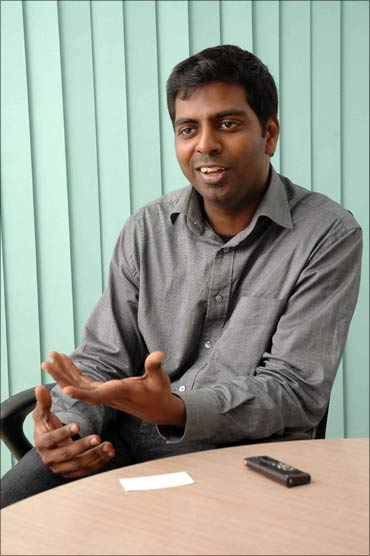
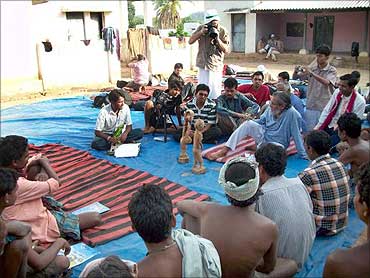
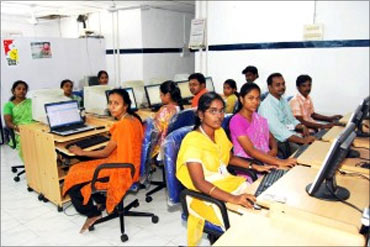

article